This past week I had the privilege of attending DMC 2016. It was the second ever DMC—organized by the digital marketing association SLC|SEM.
The conference was held at the Megaplex Theaters in Sandy, Utah. The theaters made for a great venue, specifically the large cinema screen made it very easy to follow the slides of each presenter.
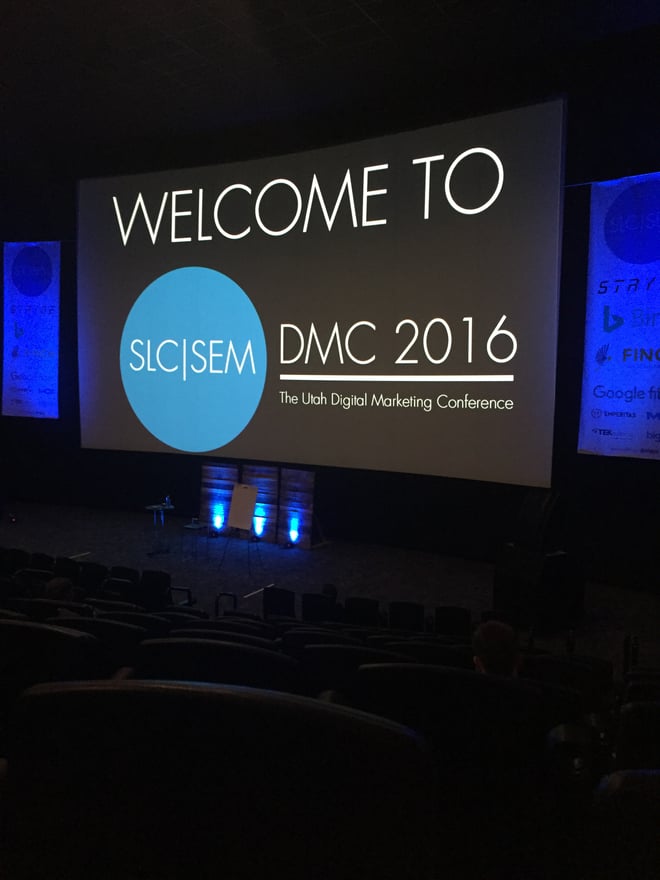
The venue was spacious, comfortable, and even included massages!
Wrap up big conference over massages priceless #DMC2016 #SLCSEM #dmcslc pic.twitter.com/uGpFDjPtPY
— Mark Herre♛ (@seogame) August 26, 2016
Along with the great venue, DMC 2016 featured an awesome group of presenters (Note: I only attended Friday's sessions of the conference, there were also presentations on paid search on Thursday):
- Marcus Sheridan
- Cory Edwards
- Purna Virji
- Alan Bleiweiss
- Justin Champion
- Amy Schmittauer
- Jonathan Maberry
The presentations were excellent and I came away with some valuable information. So, without further ado let's dive into each presentation from SLC|SEM DMC 2016!
Embrace Today's Buyer, Stand Out, and Build an Amazing Business - Marcus Sheridan Founder of The Sales Lion
What business are you in? The trust business! @TheSalesLion #SLCDMC #SLCSEM pic.twitter.com/keI1B1I4sv
— SLC SEM Prof Org (@slcsem) August 26, 2016
3 Key Takeaways:
- The business we're all in is trust.
- Be the best at answering your customers' questions.
- Eliminate the fears of the buying process.
Marcus got things started with a bang. He brought an infectious energy to his presentation that invigorated the audience and made us feel like part of the discussion.
A major point of Marcus' presentation was that the business we're all in (regardless of industry) is trust. Marcus explained that you must overcome the fears associated with your business' buying process to be successful, because when seeds of doubt exist customers won't buy.
Marcus also discussed the importance of solving your customers' problems. He suggested becoming the "WebMD" (top informational resource) in your industry to win business. Marcus challenged the crowd to assess whether their website was answering the right questions:
Great question for every business to keep in mind. @TheSalesLion #SLCSEM #SLCDMC pic.twitter.com/hGnUpSQgZV
— ThomasARTS (@ThomasARTS) August 26, 2016
Marcus explained that we're all media companies, whether we like it or not, and the greatest sales tool in the world is honest and transparent content.
How Adobe is Fighting Corporate Disillusionment with Social Media - Cory Edwards Director, Social Media and Content Marketing at Adobe
Digital transformation with @coryedwards now at #SLCDMC #SLCSEM pic.twitter.com/dkaJb7syE2
— SLC SEM Prof Org (@slcsem) August 26, 2016
3 Key Takeaways:
- Customer experiences matter more than ever.
- Simply having a social presence no longer cuts it.
- Employees can drive social media engagement.
Cory Edwards presented on the topic of social media, specifically about how to avoid corporate disillusionment with social media.
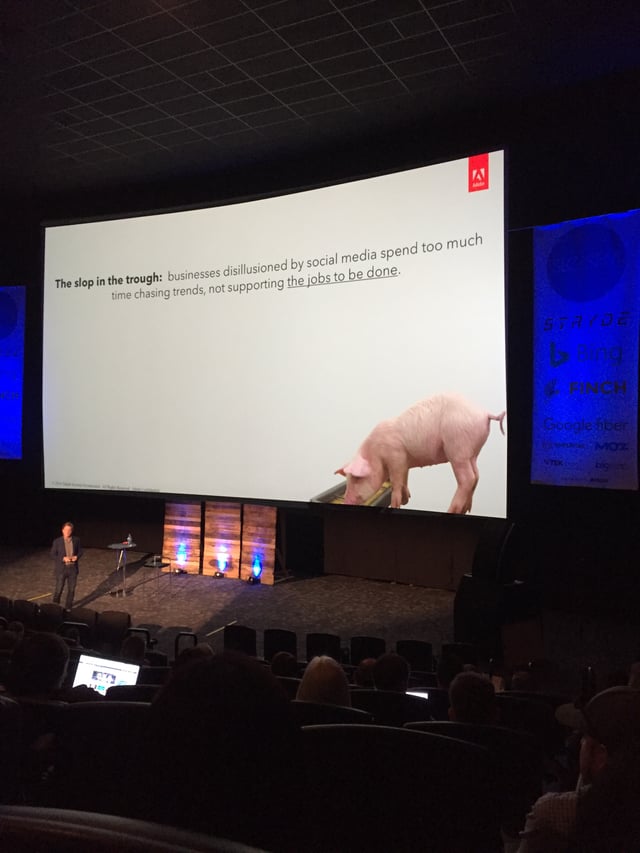
Cory explained how many businesses are using social media incorrectly, spending too much time chasing trends and fads.
Cory said that their social media objectives at Adobe are:
- Support corporate strategy.
- Grow a socially-enabled business.
- Activate a company social culture.
A major portion of Adobe's strategy involves content creation, so Adobe has created multiple platforms to deliver their content to their audience.
"If you want to be in the media....become the media" @coryedwards @slcsem #dmc2016 @avalaunchmedia @Adobe pic.twitter.com/hG0l0HHlUA
— Madelyne Van Hoff (@madelynevanhoff) August 26, 2016
One of the more interesting aspects of Cory's presentation was the data surrounding the success Adobe has had with making employees brand advocates on social.
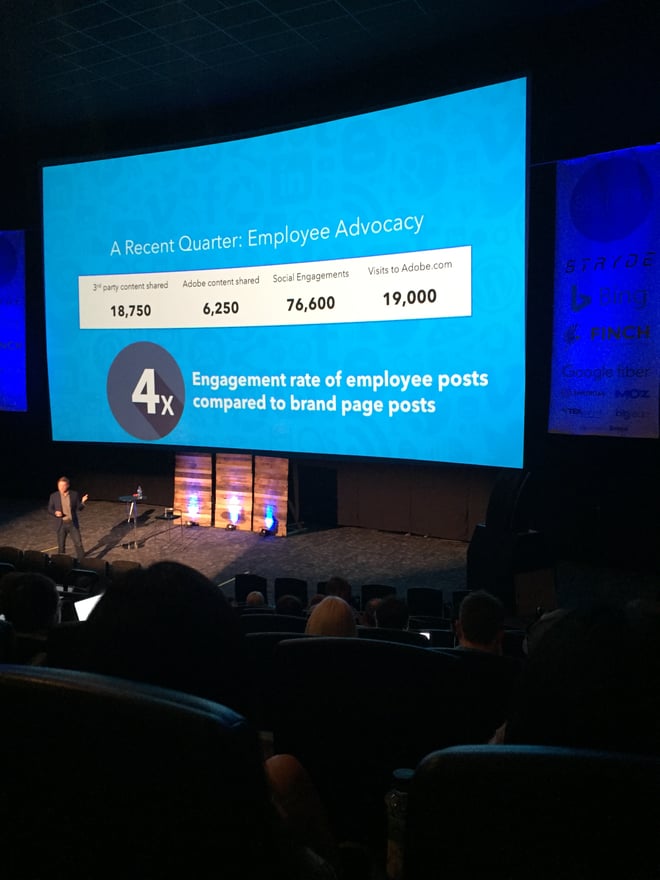
Cory pointed out that employees are typically more trusted than CEOs or branded social accounts, and the combined networks of employees are usually much larger than a single brand account's audience.
Are you Ready for Voice Search? - Purna Virji Senior Manager, PPC Training at Microsoft
Are you prepared for voice search? @purnavirji #SLCDMC #SLCSEM pic.twitter.com/OjYxhFWatE
— SLC SEM Prof Org (@slcsem) August 26, 2016
3 Key Takeaways:
- Voice search is growing in popularity and application.
- We must adapt our strategies for voice search.
- Voice search represents a real opportunity for businesses (particularly local).
Purna shared that she first started realizing the potential of voice search when she was injured and unable to type. She became very reliant on voice search and it motivated her to study the applications of voice search more thoroughly.
Purna listed these reasons as the main reasons for why people use voice search:
- Typing challenges.
- Quick answers.
- Otherwise occupied.
It was also interesting to see where people were using voice search most often:
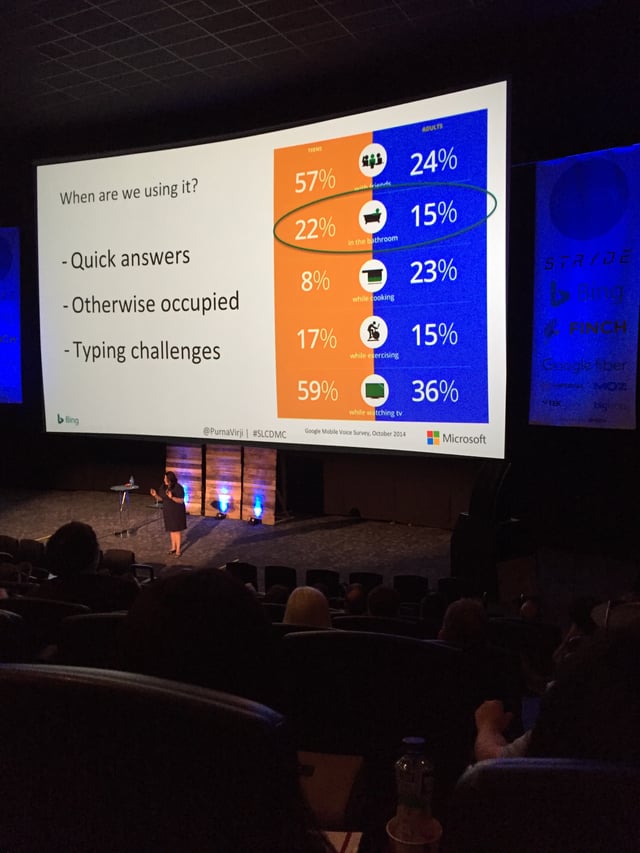
Purna made it clear that the popularity and efficacy of voice search is growing rapidly.
By 2020, 50% of searchers will be from voice. #slcdmc
— Robert Brady (@robert_brady) August 26, 2016
Particularly for local search.
Voice search has local intent 3X more than typed. @purnavirji #SLCDMC
— AJ Wilcox (@wilcoxaj) August 26, 2016
However, Purna pointed out that voice search and digital assistants still struggle with mispronunciations and language barriers. But she did mention that voice search error is down to around ~8%.
SEO Tasking Goals - Where + When to Compromise - Alan Bleiweiss Forensic SEO Consultant at Alan Bleiweiss Consulting
Back from a great lunch here at #SLCDMC to hear @AlanBleiweiss on sustainable SEO! #SLCSEM pic.twitter.com/oLniI3RFSc
— SLC SEM Prof Org (@slcsem) August 26, 2016
3 Key Takeaways:
- Sustainable SEO is possible whether a site has never had problems or had sever problems.
- Proper planning prevents pathetic performance.
- You need to establish a hierarchy of effort and start at the top and work your way down.
Alan Bleiweiss got things kicked off again after lunch by talking about SEO tasking and planning. Alan emphasized the importance of site audits, explaining that you need to evaluate your situation to ensure you have a system of sustainable SEO in place.
He also highlighted three important aspects of goal planning in SEO:
- Determine objectives.
- Evaluate needs and limitations.
- Determine when and where to compromise.
Alan stressed the importance of prioritizing issues and explained that there needs to be a hierarchy of effort, where you start at the top (most pressing need) and work your way down.
Again, Alan pointed to how useful audits can be as they will show you where you need to get.
"A proper [site] audit becomes the road map to success.“ -@AlanBleiweiss #SEO #SLCDMC pic.twitter.com/iPvBiBVz9Z
— Jessica Simmons (@J_L_Simmons) August 26, 2016
How to Reverse Engineer Your Content Marketing Plan - Justin Champion Principal Content Marketing Professor at HubSpot
On stage now is @JustinRChampion on reverse engineering your content marketing #SLCDMC #SLCSEM pic.twitter.com/dEzBLVyDrR
— SLC SEM Prof Org (@slcsem) August 26, 2016
3 Key Takeaways:
- Content marketing is a marathon, not a sprint.
- Working backwards makes it easier to solve problems.
- Develop buyer personas and identify the buyer's journey.
Justin Champion focused on content marketing.
One of Justin's main points was that content marketing is an ongoing process, not a short-term fix.
Content marketing is a marathon, not a sprint. YES! Thank you! #SLCSEM #SLCDMC pic.twitter.com/CZouk9eXst
— Kuulei Hanamaikai (@kuuhanamaikai) August 26, 2016
He cited four common roadblocks to content marketing success:
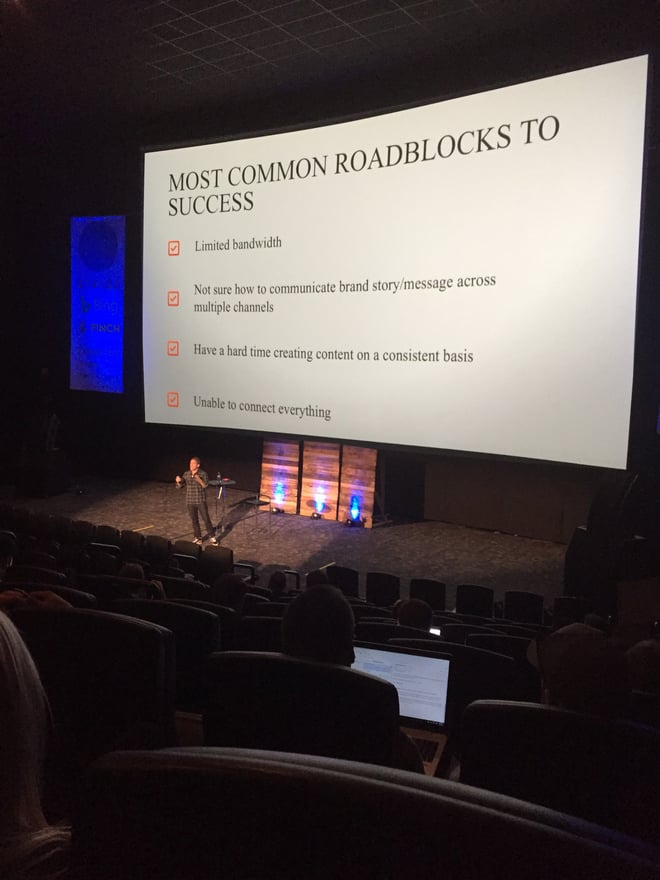
One strategy that Justin suggested for overcoming these roadblocks was to work backwards. Some of the advantages of working backwards include:
- Creating a pre-promotion plan for content.
- Building a sustainable content creation process.
- Directly connecting short-term content activities to long-term content goals.
Another main takeaway from Justin's presentation was the importance of understanding buyer personas and the buyer's journey. Here is the example buyer's journey Justin shared:
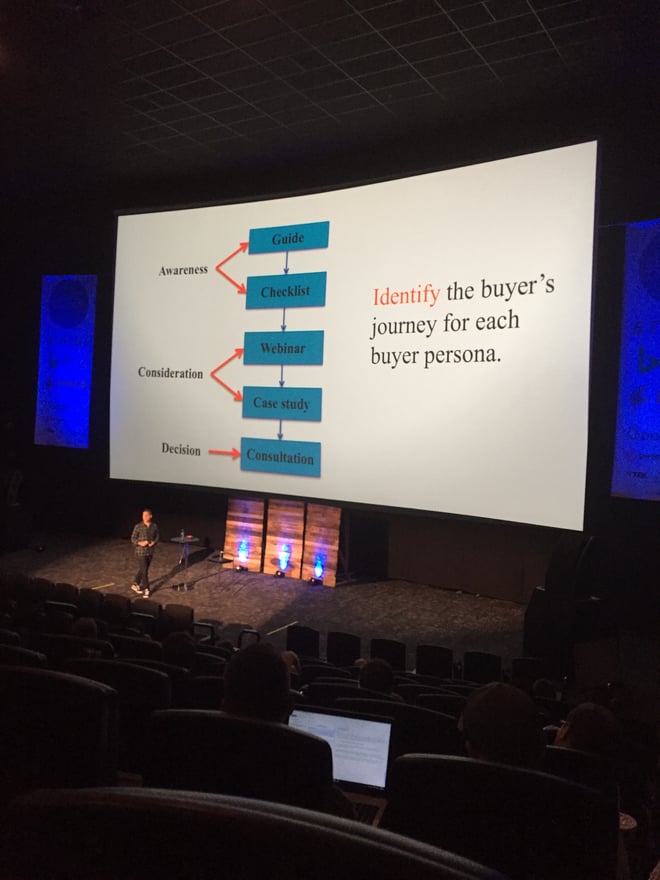
A great pro tip that Justin shared for identifying your different buyer personas was to include a "Which best explains you?" section within your forms.
How to Create Video That Builds Brand Influence - Amy Schmittauer Video, Social, Branding at Savvy Sexy Social
Awesome tips on creating video that builds brand influence @schmittastic #SLCDMC #SLCSEM pic.twitter.com/NWxtnwcg30
— SLC SEM Prof Org (@slcsem) August 26, 2016
3 Key Takeaways:
- You don't need fancy equipment to produce quality videos.
- You need a clear strategy statement about why you're making videos.
- Your first video always sucks, but you'll get better with practice.
Amy Schmittauer's session was all about video content.
Amy is an expert vlogger and social media maven, and she shared some great tips on how to overcome the common fears of creating video content.
For one, you don't need special equipment to produce great videos. Amy explained that filming video on your smart phone works just fine!
Smartphone video is relatable. If it's good enough for viewing it's good enough for filming. - @Schmittastic #SLCSEM #SLCDMC
— Big Leap (@BigLeapMKTG) August 26, 2016
Amy shared three keys to video content:
- Design
- Flow
- Distribution
Amy emphasized the importance of having a clear strategy statement that answers:
- Who's it for?
- What is it about?
- What are you trying to achieve? Why?
Apply this strategy statement to your videos. Simple and brilliant. #SLCSEM #SLCDMC pic.twitter.com/WaiC0liikm
— Kuulei Hanamaikai (@kuuhanamaikai) August 26, 2016
An excellent tip that Amy shared was to think about what you want people to say about you after watching your content.
Amy also shared her own personal "Authority Video Formula":
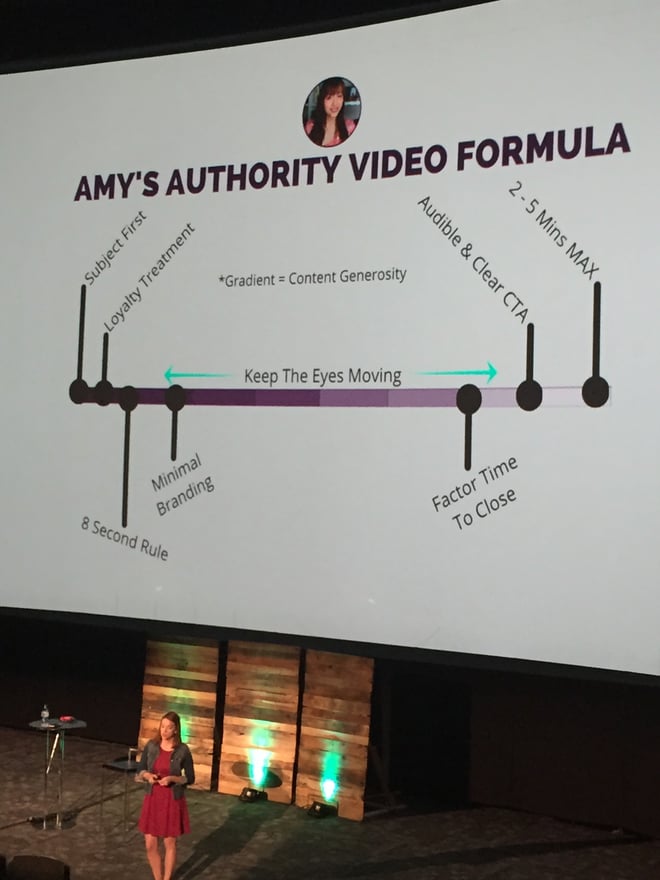
Good Guys Finish First - Jonathan Maberry NY Times Bestselling author
Closing out our conference here at #SLCDMC is the great @JonathanMaberry #SLCSEM pic.twitter.com/Q4pA4rJvPz
— SLC SEM Prof Org (@slcsem) August 26, 2016
3 Key Takeaways:
- Writing and publishing are NOT the same.
- Adaptability is essential in business.
- Be inclusive, NOT exclusive.
Wrapping up the day was NY Times Bestselling author Jonathan Maberry.
Jonathan (not surprisingly) began his presentation with a very immersive story about his childhood which included living in a rough Philadelphia neighborhood and attending meetings with famous authors.
One of Jonathan's key points was that writing and publishing are not the same, and have different goals. Writing is creativity and art, while publishing is the business of selling art. Jonathan suggested that all writers learn the business side of publishing to be successful.
Publishing and writing are not the same thing! Writing is intimate and publishing is a business. #SLCDMC -Jonathan Mayberry
— AJ Wilcox (@wilcoxaj) August 26, 2016
Another point Jonathan made was that adaptability is crucial in business. You don't want to pigeonhole yourself—if the business model changes, you adapt (or die).
A tip Jonathan had for writers was to write what you know. If you're an expert on a particular subject, write about that subject. But you shouldn't necessarily write on ultra-advanced topics (especially if you're writing for a magazine), consider writing for a larger, beginner audience.
Most “expert content” is not written for experts. It’s written for people who **want** to be an expert. - @JonathanMaberry #SLCDMC #SLCSEM
— Kirk Williams (@PPCKirk) August 26, 2016
Jonathan's presentation was titled "Good Guys Finish First" and he discussed how positivity sells and that being the good guy is infectious. He advised the audience to be inclusive rather than exclusive, and said you shouldn't attack popular products to promote yourself.
For example, Jonathan mentioned you should use social media to attract your audience, rather than use it to attack others.
Don't use social media to punch, use it to beckon @JonathanMaberry #dmc2016
— Andrew Dennis (@AndrewDennis33) August 26, 2016
Jonathan explained that storytelling is applicable to every type of messaging (novels, blog posts, videos, etc.) and suggested that to truly engage, you should build a space where your audience can discuss the relevant subject matter and tell their own stories.
My Key Takeaways
That wraps up my recap of SLC|SEM's Digital Marketing Conference 2016 in Sandy. I want to say thank you to all the speakers who shared their insight and experience, and SLC|SEM who organized the event. I hope to attend future SLC|SEM DMCs and I think this event will only continue to grow!
To finish up this post I would like to share my personal takeaways from the show. My key takeaways were:
- Building trust with your customers will lead to more sales and sustainable growth.
- Content is key to answering your customers' questions, and answering your customers' questions is key to successful business.
- Merely existing on social media is not enough, you need to deliver valuable experiences for your audience.
- Encouraging employees to be brand advocates on social media can drive business success and cultivate company culture.
- Voice search is growing and developing rapidly, and must be accounted for within your digital strategy.
- Planning and prioritization are essential to successful, sustainable SEO.
- Site audits will provide a road map for how you can achieve your SEO goals.
- Reverse engineering content can help you build larger, evergreen assets.
- Developing strong buyer personas is key to effective content marketing.
- You don't need expensive equipment to start producing video content.
- Make sure you have a defined audience and clear strategy for video content, don't simply make videos to make videos.
- People have short attention spans when it comes to video content, you need to get to the point quickly!
- Adaptability is essential in writing and business, if the model changes you have to be willing to change with it.
- Positivity sells, be inclusive rather than exclusive and don't tear down others to lift yourself up.

